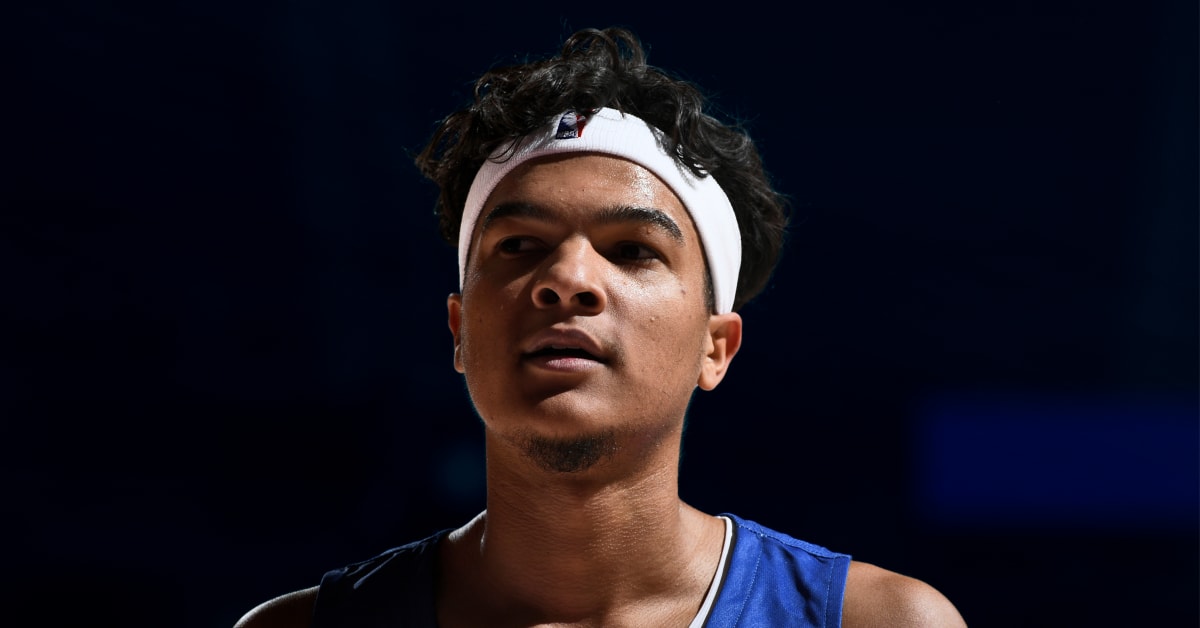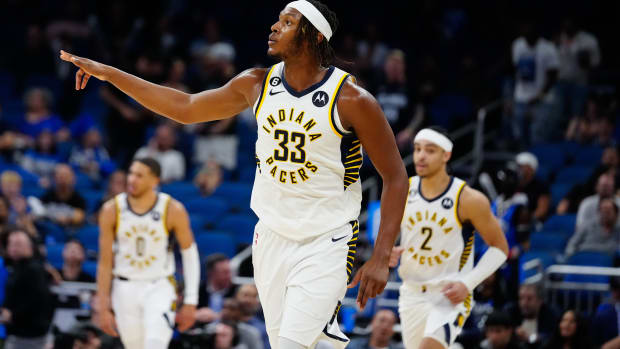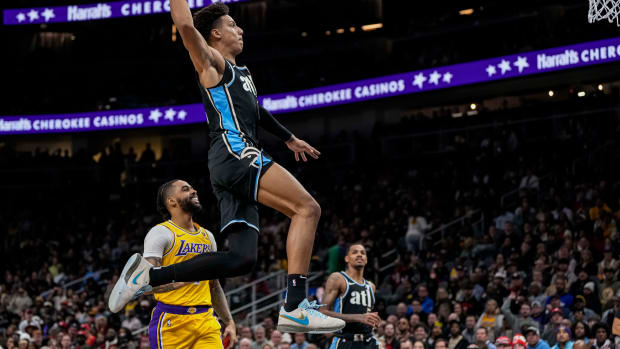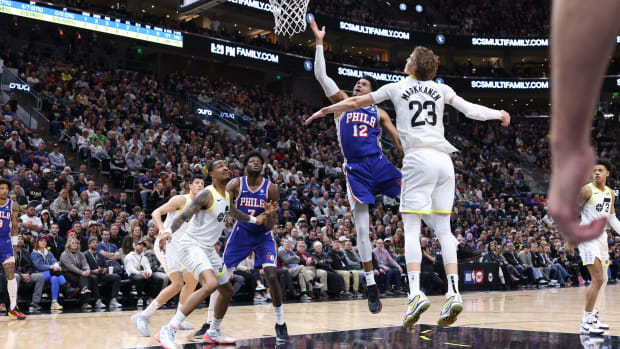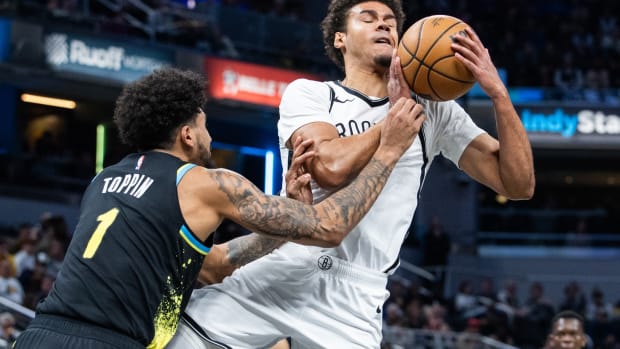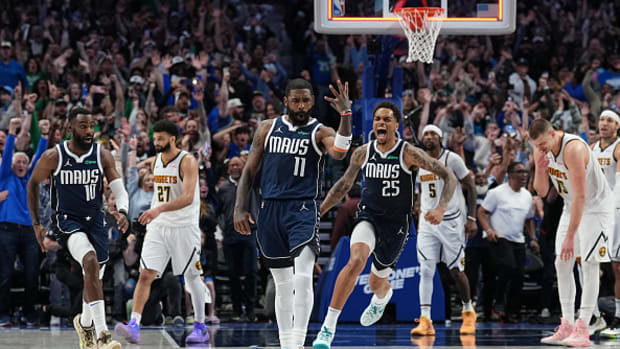Tyrell Terry scored his first points on the NBA stage on Christmas Day 2020. The Stanford standout was in at guard for the Mavericks, who had just drafted him No. 31, one slot behind Desmond Bane. Terry laid the ball up and in near the end of a Lakers blowout, while one of his favorite players, LeBron James, looked on. He would earn $1,289,846 that season.
Just about two years later he was on Instagram, typing out a post. He was announcing his decision to quit professional basketball, at age 22.
“While I have achieved amazing accomplishments, created unforgettable memories, and made lifelong friends…I’ve also experienced the darkest times of my life,” Terry wrote in part. “To the point where instead of building me up, it began to destroy me. Where I began to despise and question the value of myself, much more than those surrounding me could ever see or know.”
Just posting that he’d made the decision immediately improved his mood.
But he didn’t expect the post, in which he went on to describe his anxiety disorder, to spread nearly as far as it did. It amassed nearly 30,000 likes, a huge embrace for a guy who only some NBA diehards had ever heard of. Terry received messages of support and stories from young athletes and their parents. Sixers forward Tobias Harris reached out. So did the father of Hawks All-Star Trae Young. Current and former college players, like Jeff Capel of Duke (who is now the head coach of the men’s team at Pitt), also got in touch.
“If you Google my name it’ll probably be ‘Ex-Athlete Steps Away From the Game for Mental Health,’” Terry says. Tying himself so closely to his identity as a young, retired basketball player for the foreseeable future gave him pause about Instagramming. “But when I read some of the DMs that people have sent me—I’ve had phone call conversations with parents of athletes who are struggling—and just the kind words and the gratitude that they’ve showed me, it pushes those second thoughts to the side and makes them less relevant.”
Often, public figures have their lives online defined by criticism. That wasn’t Terry’s experience, though. There was some hate, of course—people concern-trolling about how Terry would hold down a 9-to-5 gig if he couldn’t handle himself on an NBA court; others just writing that he should’ve sucked it up and pushed through—though less than you might think.
“These are people who have never been there,” says Dan Poneman, Terry’s agent and close friend. “They’ve never dealt with hundreds of people on Twitter debating if you’re too skinny to play in the NBA or if you get a shot blocked people tweeting at you telling you you suck or you’re a bust. They’ve never dealt with going to practice and you do a weigh-in and you lost a pound last week and you have five disappointed faces looking at you because they’re investing all this money in you gaining weight and making shots. It’s a different level of pressure.”
Letting go for Terry is far easier than puking every morning before practice or a game. It’s easier than dealing with the resulting depression. It’s easier than enduring frequent panic attacks. It’s easier than not wanting to go to sleep so you don’t have to face the next day. Terry says he doesn’t ordinarily face extremely high levels of anxiety in his life outside of basketball.
Terry and Poneman had reviewed Terry’s options many times before—push through, walk away, find a new team. “This time,” Poneman says of the night before Terry posted on Instagram, “when we talked there was a different level of finality about it.”
Terry had shone in his lone season at Stanford, averaging 14.6 points, 4.5 rebounds, 3.2 assists and 1.4 steals per game and shooting 89.1% from the free throw line. He earned both All-Freshman Pac-12 honors and an honorable mention for the All-Pac-12 team; the last such player to do so for the Cardinal was future Bucks stalwart Brook Lopez. Generally, he enjoyed himself, too, which made what came next even more surprising.
There’s no real precedent for this kind of ultra-early retirement in professional sports from such a promising athlete, especially due to mental health reasons. Terry’s situation is not really similar to the 2018 admissions from Kevin Love and DeMar DeRozan that they were experiencing anxiety and depression, respectively. Those guys ultimately wanted to stay in the game and were applauded for it; Terry needed to get out. In his case, the general sentiment seemed supportive, yes, but full of disbelief. An athlete this young squandering his talent? It was unheard of.
Royce White’s infamous departure from the NBA a decade ago might be the closest comparison, but White continued to try to make basketball work abroad, then in MMA, then in national right-wing politics. Terry, however, wants a second career with none of that limelight. He would be perfectly happy with an anonymous future. If he has his way, you might not hear from him often, unless he, one day, ends up being your lawyer.

After a standout season at Stanford, Terry was drafted 31st in 2020 by the Mavericks.
John McCoy/Getty Images
Terry has since characterized what he was going through as an identity crisis. Many players, while in the NBA, likely find themselves more consumed by basketball than ever before. For Terry, the opposite happened: Entering the pros made him realize how little he needed the sport. Of the Instagram post, “It’s been an almost overwhelming amount of support I’ve gotten,” he says, “which obviously makes the process of letting the sport go a lot easier.”
It’s a familiar story: Growing up in Minneapolis, Tyrell loved basketball. In his earliest memories, he was shooting on a toy hoop. As he got older, he felt pressure from his parents—both former amateur basketball players—and coaches to prioritize hoops and join the AAU circuit. By seventh or eighth grade, those around him knew he was good enough to earn a college scholarship. But the intense focus on basketball came at the expense of his interest in and talent for other sports, including football (quarterback) and baseball (pitcher and shortstop).
“Since a young age I had already been sacrificing things that maybe I wanted, internally, myself, for basketball and for those around me,” Terry says.
Tyrell had always been a slightly nervous kid. But even as he grew into a teenager and a four-star recruit, he didn’t feel more than some routine butterflies and jitters before big games.
“I was always the best player,” he says. “I didn’t have to worry about a lot of team dynamics or being at the bottom of the roster and having to work my way up and not getting any playing time. So it was really easy for me to just go through the motions if I wasn’t feeling it all in.”
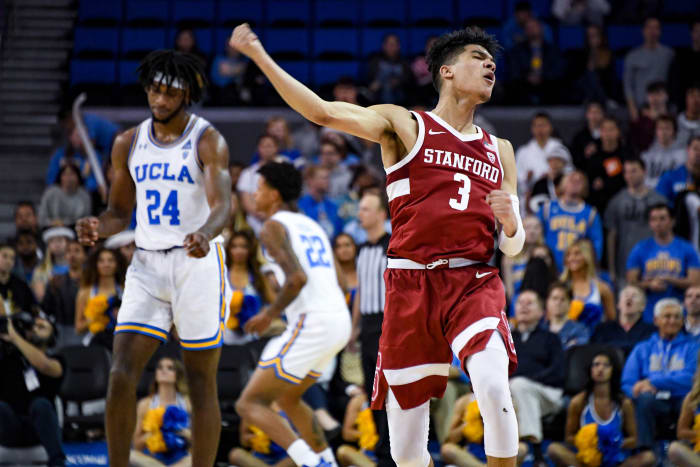
Now that he's retired from basketball, Terry wants to go back to Stanford to get his degree and live the life of a normal student.
Kirby Lee/USA TODAY Sports
Terry picked Stanford not just for basketball but also in equal part for its high-caliber courses. “I’ve always been somebody that’s taken academics just as serious as athletics. I had that mindset since I was pretty young,” he says. “I was never really under the assumption that I would make the NBA.”
But in April 2020, influenced by the uncertainty the next college season would bring, Terry declared for the NBA draft, describing the opportunity to go pro as a “childhood dream.” “I am confident in my abilities to play at the highest level and look forward to giving it 100% at each step throughout this process,” he wrote on Instagram at the time.
The draft wasn’t held until November due to the COVID-19 pandemic, which meant Terry and others faced more than half a year of lifting and training solo. That isolation and repetition made him start feeling like he was losing his love of the game. “I got really tired of it and really burnt out during that process,” he says. “But I knew that big things and big accomplishments were right around the corner.”
He figured his funk would end once he got selected and began working with his new teammates and coaches. After becoming the first pick in the second round, he was headed to a near-dream situation for a rookie: He was going to the on-the-rise Mavericks to play alongside superstar Luka Dončić. No pressure.

Terry took a leave of absence from the Mavericks after just 11 games.
Scott Audette/NBAE/Getty Images
The funk never ended. The G League never played a real season, and he didn’t get a full-time NBA roster slot. Basketball with the Mavericks felt lonely for Terry, even when he wasn’t alone.
Elite athletes, the common thinking goes, aren’t supposed to feel this way. Their mental illnesses should be, many fans would like to believe, mere obstacles on the journey toward developing mental toughness, whatever that means, not read as signals that they might not be cut out for careers in sports.
“I didn’t even really see the game as an art anymore. I didn’t see it as just a game anymore or something that I loved,” he says. “It felt like something … that I was gaining resentment for.”
As Terry’s rookie year continued, he felt worse and worse. His anxiety ramped up. Nausea kicked in daily. Every time he had to go to practice or the gym, he’d puke first. I really don’t want to go do this, he’d think to himself. He began to have frequent panic attacks when he thought about playing. He felt a rock sitting on his chest.
“You feel a squeezing sensation, and it’s just hard to take normal breaths at that point,” he says. “When you wake up every day and feel like that for a certain reason, you begin to despise the reason that’s causing it.”
He threw himself into trying to appreciate basketball again as an art, but all he could focus on were the minute details.
“I would always be someone who would overanalyze,” Terry says. “Who’s my matchup? How good are they? How am I going to perform? How many people are in the crowd? What if we win? What if we lose? What does that look like? What if I go out there and shoot 0-for-15? How does that look?”
Even as he struggled deeply with that onslaught of concerns, he felt his anxiety wasn’t warranted.
“I had just gotten a bunch of money,” Terry says. “I had just gotten a bunch of attention, so I really started to tell myself that I had nothing to be anxious for. I had nothing to be sad for. I don’t really deserve to be sad. And then obviously with the societal pressures of being a man, I didn’t want to look soft.”
Following a half-season trying to cope with his negative thoughts and the accompanying physical symptoms, Terry took a leave of absence from the Mavericks after seeing the court in just 11 games. He had tried working with a sport psychologist employed by Dallas but worried that the professional was just trying to rush him back onto the court so he could perform, at the expense of his mental health. It’s a growing concern among athletes: that a team paying a mental health clinician’s bills can’t fully guarantee honesty and confidentiality, no matter what they say.
“I don’t think [the sport psychologist] really understood how bad of a spot I was in,” Terry says.
Starting in March 2021, Terry spent several months on anti-anxiety medication. It helped a little bit, but he hated the way it made him feel. He would get nauseated whenever he took his medicine without a full meal and sometimes even when he did. Plus, he didn’t like the idea of being dependent on daily medication—“stubbornness,” he says.
So Terry quietly tried psychedelics, which current and former professional athletes are increasingly turning to for mental health reasons. He worked with Mike Dow, a psychotherapist at Field Trip Health, which operates clinics for psychedelic-assisted treatment in the U.S. and abroad.
“The fact that he was willing and open enough to do these really heart-opening, not always easy but profoundly effective sessions and still was not able to play, I think you can give him credit for really trying anything and everything,” Dow says.
Terry went through several rounds of ketamine-assisted therapy (and tried psilocybin—magic mushrooms—in a nonclinical setting) with the express goal of returning to basketball with less anxiety, rather than the goal of figuring out whether basketball even fit into his life anymore.
“I wasn’t really doing it for myself as a person,” Terry says. “I was doing it for the basketball player. I was coming to conclusions that it didn’t matter if I shot 0-for-11 the next game, because no one’s going to remember that. Those things didn’t really help me with everything I was going through. It didn’t really click until I started to do the medicine for myself as a person.” He needed to undergo therapy not for Terry, the basketball player, but Terry, the person.
Every time Terry would try to return to basketball, he’d feel ready, until it was time to actually report to the gym or the court. Then the puking and the panic would resume. Already a lean guy, he lost weight. He forced himself to down protein shakes. Are people just judging me whenever they look at me? he would ask himself. He had gotten past a childhood uneasiness that, being biracial, he would never truly mesh with his white classmates or his Black teammates, but the lingering feeling that he didn’t quite fit in anywhere never really faded.
Terry signed a 10-day contract on Christmas Day 2021 with the Grizzlies, which turned into a two-way deal. (He played two games with the Grizz.) He was waived by Memphis last July. Poneman suggested he play in Summer League to keep his options open for interested teams, but he didn’t want to. He couldn’t love the NBA or G League environment. That’s how Terry ended up in Würzburg, Germany, months later, on the verge of a new beginning in a new league but instead quitting the sport for good.
He probably won’t be a basketball coach or hold another job adjacent to the game, at least not anytime soon. Terry, who has moved back to Minneapolis, wants to return to college and maybe study philosophy; he is an overthinker, after all. “The idea that everybody dies one day and we’re just really small people in a vast universe—I think that’s something that I want to look deeper into,” he says.
Terry’s leaving his career options open, as many college kids do. He wants to learn what his passions are. He’ll definitely use the time on campus to reconnect with old friends—some on the basketball team, some not. He’ll soak in the day-to-day. He might try club soccer.
“Going back to Stanford University,” he says, “isn’t too bad of a Plan B, you know?”






























